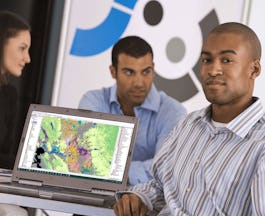Filter by
The language used throughout the course, in both instruction and assessments.
Results for "real-world+scenario+application"

Board Infinity

Coursera Project Network
Skills you'll gain: Probability Distribution, R Programming

University of California, Davis
Skills you'll gain: ArcGIS, Spatial Analysis

University of Michigan
Skills you'll gain: Human Computer Interaction, Virtual Reality, Computer Graphics
 Status: Free
Status: FreeCoursera Instructor Network
Skills you'll gain: Critical Thinking

Advancing Women in Tech
Skills you'll gain: Security Engineering, Cloud Computing, Product Management

Georgia Institute of Technology
Skills you'll gain: Cloud Computing, Software-Defined Networking

Advancing Women in Tech
Skills you'll gain: Product Strategy, Leadership and Management, Product Management, Strategy

University of Minnesota
Skills you'll gain: Decision Making, Probability & Statistics, Probability Distribution, Statistical Analysis, Data Analysis, General Statistics

University of Michigan
Skills you'll gain: Research and Design, User Experience, User Experience Design, User Research, Human Computer Interaction, People Analysis, Design and Product, Critical Thinking, Data Analysis, Communication

L&T EduTech

Skills you'll gain: Communication, Leadership and Management, Planning, Problem Solving, Project Management
In summary, here are 10 of our most popular real-world+scenario+application courses
- Key Enablers and Challenges in Implementing Industry 4.0: Board Infinity
- Using probability distributions for real world problems in R: Coursera Project Network
- GIS Applications Across Industries: University of California, Davis
- Intro to AR/VR/MR/XR: Technologies, Applications & Issues: University of Michigan
- GenAI in Action: From Theory to Real-World Impact: Coursera Instructor Network
- Real-World Cloud PM 2 of 3: Managing, Innovating, Pricing: Advancing Women in Tech
- System Issues in Cloud Computing: Georgia Institute of Technology
- The Business of Product Management II: Advancing Women in Tech
- Simulation Models for Decision Making: University of Minnesota
- Understanding User Needs: University of Michigan










